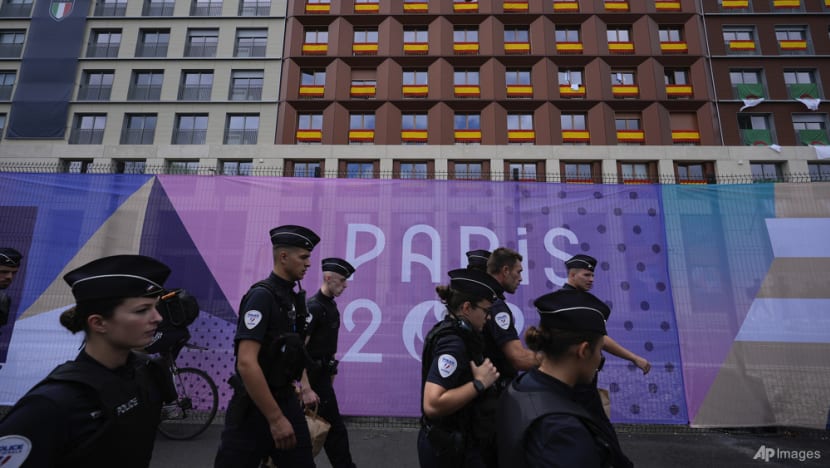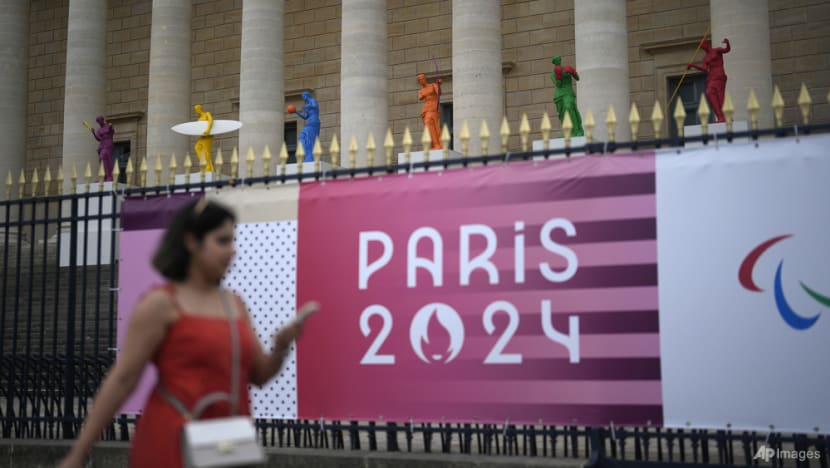Ongoing global conflicts, cybersecurity concerns weigh on the 2024 Paris Olympics
The International Olympic Committee has long sought to cast the Games as a platform for peace and neutrality, but some observers say the Olympics is inextricably linked to global politics and tensions.

Police walk outside the perimeter of the Olympic Village, past housing for the Spanish, Italian and Moroccan teams, at the 2024 Summer Olympics, Tuesday, July 23, 2024, in Paris, France. (AP Photo/Rebecca Blackwell)

This audio is generated by an AI tool.
PARIS: The upcoming Paris Olympic Games is taking place in a deeply divided world rife with ongoing conflicts, big-power rivalry, and cybersecurity risks.
For instance, there have been warnings of Russian cyberattacks and disinformation campaigns targeting the Olympics.
The Paris 2024 organising committee is also wary of the impacts of the Israel-Palestinian conflict, the rivalries between world powers, and social rights movements spilling over into the sporting arena, as has happened at numerous Olympics before.
Despite these concerns, organisers are confident that the Games, set to take place from Friday (Jul 26) to Aug 11, will be a success.
POLITICS MIXED WITH SPORT
The International Olympic Committee (IOC) has long sought to cast the Games as a platform for unity, but some observers said the Olympics is inextricably linked to global politics and tensions.
With millions of people watching around the world, political messages sometimes make their way onto the tracks, into the pools, and at the stadiums.
A new exhibition in Paris, titled "Olympism: A History of the World", retraces 130 years of the Olympic Games through art, rare documents, films and photographs.
The exhibition, which runs until Sep 8, shows how the Games has not only celebrated sporting feats, but also reflected social, political and cultural changes that took place across the world.

These iconic moments where politics mixed with sport include the civil rights struggle in the United States and the end of apartheid in South Africa.
But the Olympics is also an arena where various global conflicts have played out.
“We have well-known examples like the boycotts of the 1980s,” said Olivier Bedoin, exhibition assistant at the National Museum of History and Immigration.
“The US sporting delegation did not go to Moscow in protest at the Soviet invasion of Afghanistan. Four years later, Russian sportsmen and women did not go to the Games in Los Angeles in retaliation.”
Related:
IOC HAS ITS “OWN POLITICAL AGENDA”
Observers said geopolitics will once again cloud this year's Games.
The IOC has banned Russia from sending teams following its invasion of Ukraine, and has also barred Belarus for its support of Russia.
But it has allowed some of their athletes to participate as individuals under a neutral flag.
Some Russians and Belarusians have already arrived in the athletes’ village in Paris to compete, but they will represent themselves and not their countries.
“Each Olympic Games is a sounding board for the upheavals in the world, for geopolitical disruptions, social movements, (and) the fight for rights,” said Bedoin.
“Each Olympiad is marked by the political colours of the time. It was the case in Athens in 1896, and in Helsinki in 1952, and it will probably be the case this time in Paris 2024.”
The IOC has stated that it is politically neutral and is strongly against the politicisation of sport, but this is a position that some experts question.
“The International Olympic Committee, like governments, businesses or media, has its own political agenda,” said Lukas Aubin, senior research fellow specialising in the geopolitics of sport at the Institute of International and Strategic Relations, a French think tank.
“The IOC's political agenda is to create a form of sporting hegemony on a global scale through the Olympic and Paralympic Games.”














